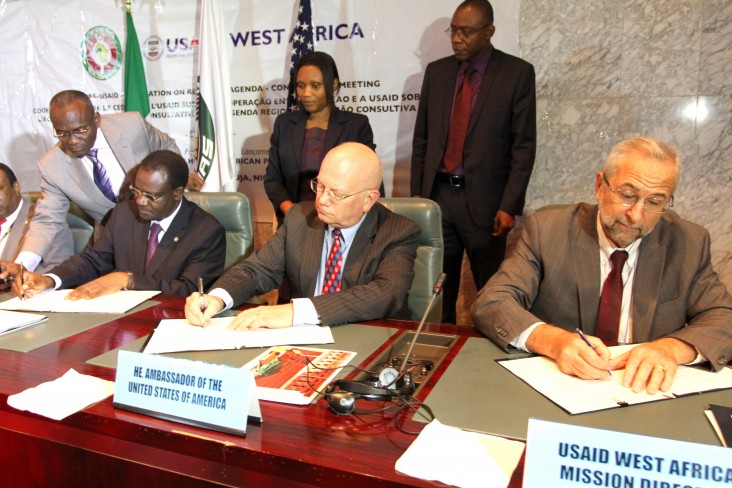
For Immediate Release
Abuja, Nigeria – Today, the U.S. Agency for International Development (USAID) and the Economic Community for West African States (ECOWAS) expanded their partnership to promote peace and security, address energy challenges, and support trade activities in the region. With these amended agreements, USAID will provide an additional U.S. $ 23.6 million of support for activities promoting the following ECOWAS priorities:
• Countering violent extremism in the region, particularly in the Lake Chad Basin, by empowering youth and fostering moderate, non-extremist voices;
• Improving citizens’ access to justice;
• Increasing electrical generation;
• Expanding cross border trade in electricity;
• Reducing greenhouse gas emissions; and
• Promoting the commercial viability of business investment in West Africa, primarily through our new Trade Hub.
Following the signing ceremony, USAID and ECOWAS launched the new Trade Hub and African Partner Network to assist West African farmers and firms to compete, attract, and increase trade and investment in regional and global markets. This three-year, up to $31 million project, funded by the U.S. government, builds on the successes of previous trade projects.
“Under the new West Africa Trade Hub, USAID will collaborate with ECOWAS to increase exports from the region – making West Africa more competitive in world markets,” said U.S. Ambassador to Nigeria James F. Entwistle. “That work is complemented by teams tackling problems in transportation, telecommunications, access to finance and business environment that make it difficult for West African companies to compete.”
The Trade Hub will:
• Empower private sector associations to better link producers and processors with buyers, to gain a better understanding of international market requirements; increase access to timely, accurate market information; assist farmers and firms to produce the commercial volumes necessary to supply those markets; and meet market requirements and international standards;
• Catalyze reform in the business environment to allow for efficient, freer trade. This is a key area of collaboration with ECOWAS. Activities include removing barriers to trade, such as bribes, along targeted transportation corridors and reducing unnecessary bureaucratic delays at borders and ports; and
• Modernize finance by increasing access to finance through traditional bank lending as well as initiating contracts with buyers and processors so farmers can scale up food production.
The Trade Hub will focus on private sector alliances in the livestock, grains, cashew, shea, honey, apparel, and sesame sectors, and will be implemented in close coordination with a network of African regional private sector partners and public institutions, including ECOWAS and the West African Economic and Monetary Union (UEMOA).







Comment
Make a general inquiry or suggest an improvement.